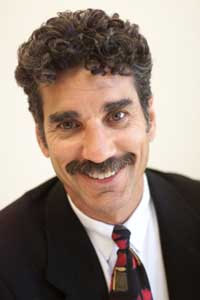Cacioppo will join national council that serves needs of aging
By William HarmsNews Office
 John Cacioppo |
John Cacioppo, the Tiffany and Margaret Blake Distinguished Service Professor in Psychology, has been selected to serve on the National Advisory Council on Aging, the group that advises the National Institute on Aging on the conduct and support of biomedical, social, and behavioral research and training on the diseases and conditions associated with aging.
U.S. Department of Health and Human Services Secretary Tommy Thompson recently announced the new council members.
A social neuroscientist, Cacioppo investigates how societal influences and personal relationships affect cognition and emotions, the underlying neural substrates and mechanisms, and peripheral response.
Cacioppo leads a team of scholars that received a $7.5 million grant from the National Institute on Aging to study social, behavioral and neural mechanisms responsible for the association between social isolation (and feelings of isolation) and broad-based morbidity and mortality. As part of this effort, Cacioppo and his colleagues are conducting a longitudinal study of more than 200 adults between ages 50 and 67 over a five-year period.
A faculty member since 1999, Cacioppo also has ongoing research in the area of social and cognitive neuroscience funded by the National Science Foundation, the National Institute of Mental Health and the Department of Naval Research.
He is the co-author of a number of books, including Attitudes and Persuasion: Foundations in Social Neuroscience (2002), The Handbook of Psychophysiology (2000), Emotional Contagion (1994), and Principles of Psychophysiology: Physical, Social and Inferential Elements (1990).
He was an assistant professor in psychology at Notre Dame from 1977 to 1979 before he took an appointment at the University of Iowa, where he served as an assistant professor and then professor in psychology until 1989. He then joined the Ohio State University faculty.
Cacioppo received a B.S. in economics in 1973 from the University of Missouri and an M.A. in psychology in 1975 and Ph.D. in psychology in 1977 from Ohio State University.
The other new members of the council are Alan Garber, director of the Center for Health Policy and the Center for Primary Care and Outcomes Research at Stanford University, and Virginia Lee, professor of pathology and laboratory medicine at the University of Pennsylvania School of Medicine.
Two-thirds of the 18-member council are from the health and scientific disciplines, particularly the biological and medical sciences, and one-third is from the general public, including public policy, law, health policy, economics and management. Council members are appointed for overlapping terms of four years.
The NIA, a component of the National Institutes of Health within the U.S. Department of Health and Human Services, is the lead federal agency supporting and conducting biomedical, social, and behavioral research and training related to aging and the special needs of older people.
![[Chronicle]](/images/sidebar_header_oct06.gif)